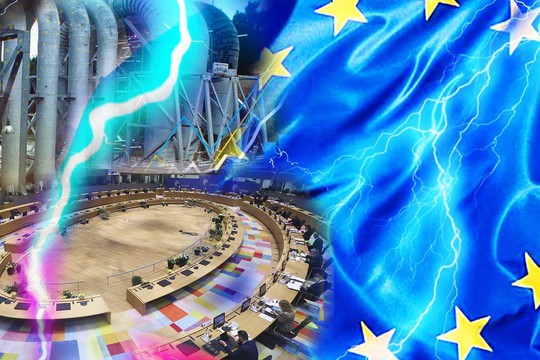The far-right Alternative for Germany (AfD) is set to make the controlled dissolution of the EU one of its key targets for the upcoming European elections, with its leader Tino Chrupalla calling Hungary’s Prime Minister Viktor Orbán one of his main allies.
In their EU election manifesto proposal, which is due to be ratified during the party conference on 29 July, the AfD calls for a “controlled dissolution” of the “overbearing EU”.
“We’re demanding a reset for Europe so that we can use the potential of nation-states and rebuild the bridge to the east,” Chrupalla, co-leader of the AfD, told EURACTIV. The EU is an “economic area alone and should remain one,” he added.
The European Union “hogs national competencies without being able to replace the nation-state” while being insufficiently democratic as the Commission lacks legitimacy, he argued.
Chrupalla also cited EU sanctions against Russia as a prime example of the EU’s illegitimacy, saying they were “not in the interest of citizens” and led to rising inflation and recession.
Instead, the AfD is proposing to replace the EU with “a new European economic and interest-based community, a league of European nations”.
The AfD’s proposal, which would effectively lead to Germany exiting the EU, has been a longstanding party position originally found to dissolve the monetary union.
Already in the last Bundestag elections, the AfD campaigned for the complete dissolution of the EU.
Since then, however, the positions of many of its far-right sister parties in the EU political group Identity and Democracy (ID) groups have softened considerably.
Marine Le Pen’s far-right Rassemblement National party in France, for instance has since abandoned the idea to dissolve the EU and pushed for a fundamental reform of the bloc instead – something the AfD says is impossible.
Similarly, Matteo Salvini’s far-right Lega party in Italy is currently looking to become more presentable while forging a broad alliance with the centre-right forces for the upcoming elections, slowly abandoning its eurosceptic ideas.
However, Chrupalla is optimistic that the dissolution of the EU could take shape and is placing his bets on the right-wing parties in Austria and Hungary.
“The prospects [for implementing the proposal] are good as the global trend is in our favour,” he said.
Both Austria and Hungary would be ideal partners and natural allies for the AfD.
“The Central European cooperation with Hungary and Austria is of central importance for Germany,” said Chrupalla, adding that Orbán “is already showing how interest-based politics can be realised in Europe.”
On the side of Austria, the far-right Freedom Party (FPÖ) is currently leading the polls despite its frequent allegations of corruption. Similarly, Orbán’s Fidesz is projected to gain almost half of the votes, with its closest contender lagging nearly 30% behind.
The AfD itself also recently made a comeback as the party is currently polling second place at around 20%, even ahead of the Chancellor’s social democratic (SPD) party.
Meanwhile, the FPÖ has already voiced their support for the AfD.
read more in our Telegram-channel https://t.me/The_International_Affairs

 11:42 25.07.2023 •
11:42 25.07.2023 •























